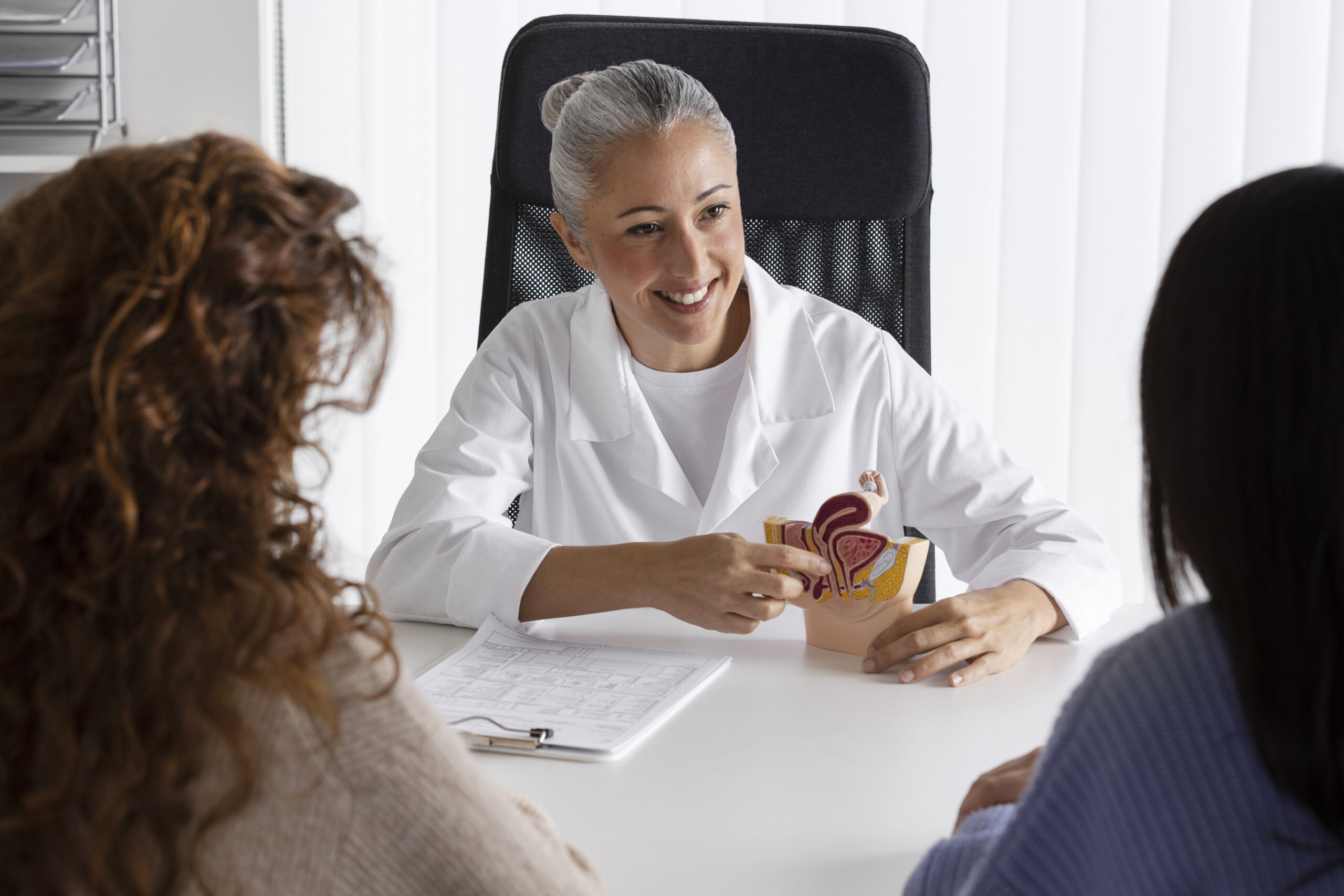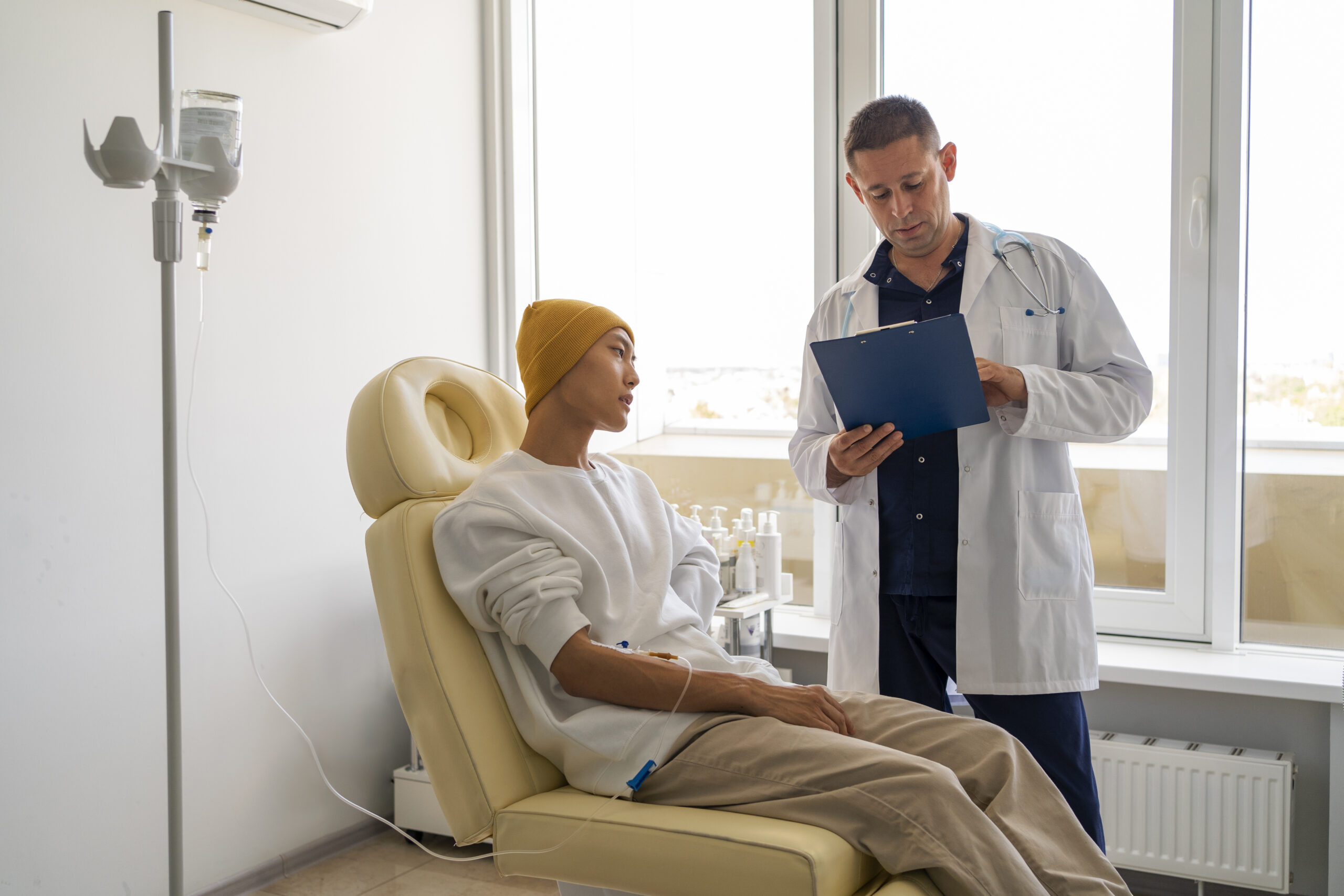An oncologist is a medical professional responsible for diagnosing, treating, and engaging in cancer-related activities. This specialist also identifies pre-cancerous conditions and manages the complications that arise during cancer-related illnesses.
They develop treatment plans, including chemotherapy, radiation, surgery, or targeted therapies. Oncologists also monitor patients' progress and adjust treatments as needed. They provide supportive care and manage cancer-related symptoms throughout the disease. Additionally, oncologists work closely with other healthcare professionals to coordinate comprehensive care for cancer patients.
Visiting an oncologist doesn't always mean undergoing invasive and challenging cancer treatments; sometimes, it's simply a matter of seeking medical advice to rule out the possibility of cancer.

Oncology![]() is a field of medicine that is dedicated to the prevention, diagnosis, and specialized treatment methods of various cancers
is a field of medicine that is dedicated to the prevention, diagnosis, and specialized treatment methods of various cancers![]() . It is a broad specialization also devoted to the search for the causes of cancer diseases, pathology, and epidemiology of this phenomenon.
. It is a broad specialization also devoted to the search for the causes of cancer diseases, pathology, and epidemiology of this phenomenon.
Among the subtypes of oncology is clinical oncology, which includes comprehensive care for oncological patients, excluding surgical treatment. Radiotherapeutic oncology is the second oncological subspecialization, which involves planning radiotherapy procedures and cooperation with other specialists, e.g., a medical physicist or an electroradiology technician.
Another variety of this medical field is surgical oncology, within which patients are referred for selected surgical procedures, and they are performed.
It's important to remember that early intervention in oncology often leads to complete recovery from cancer. Therefore, preventive measures, such as self-examination, monitoring one's body, and undergoing regular tests, can yield invaluable results.
Treatment of cancer diseases is often the work of a team of specialists. It includes:
Any person who notices disturbing symptoms, is genetically predisposed (there have been cases of cancer among close family members), or suspects cancer for other reasons can make an appointment with an oncologist![]() .
.
To register for an oncology consultation, you do not need a referral; just an identity document and valid health insurance.
If your family doctor or another specialist suggests a visit to an oncologist, ask them for a recommendation. It can tell you where oncologists work in your area or indicate a facility, website, or place where you can count on specialist support.
The fastest way to get the information you need is to browse the web. Using a browser, you can find nearby clinics and learn more about the doctors working there. You can often also make an appointment by registering online. Family members and friends who have visited an oncologist and often also had cancer can be a source of information.
Internet forums, websites, and social media groups that bring together cancer patients, often with a specific type of disease, such as lung cancer patients, will also be helpful. There, you will learn about the experiences of patients who have undergone a similar process and can recommend doctors and facilities where they were treated. You can also contact foundations and associations working to fight cancer for advice.
They work closely with experienced oncologists who specialize in specific types of cancer and can recommend the right doctor for you.
It is difficult to list all the symptoms that may indicate a visit to an oncologist – after all, cancer can affect many organs. That is why so-called oncological vigilance is recommended – careful observation and self-examination of your body. Any change in the skin's appearance or the body's functioning can be disturbing. Among the most common symptoms![]() , it is worth mentioning:
, it is worth mentioning:
The list of cancers![]() treated by an oncologist is very long. These include:
treated by an oncologist is very long. These include:
For your first visit to the oncologist![]() , take your current medical records with you so that the doctor has a full picture of your health. Recent test results and information about previous serious illnesses, procedures, or surgeries will be useful. If you are undergoing chronic treatment, also prepare a list of medications and supplements you are taking, if any. Before the consultation, write all the issues you want to ask about on a piece of paper so that you do not forget them under the influence of emotions.
, take your current medical records with you so that the doctor has a full picture of your health. Recent test results and information about previous serious illnesses, procedures, or surgeries will be useful. If you are undergoing chronic treatment, also prepare a list of medications and supplements you are taking, if any. Before the consultation, write all the issues you want to ask about on a piece of paper so that you do not forget them under the influence of emotions.

Note the observed symptoms, ailments, duration, and occurrence frequency. Also, collect information from family members – find out if any of your relatives have had cancer, and if so, when and what type. Family history in oncology is important.
Many patients also find it helpful to familiarize themselves with basic oncological terminology before the visit—it makes it easier to understand and assimilate information received in the office.
Ensure you have your ID, medical records (if applicable), list of medications, symptoms, questions for the doctor, and something to take notes with when you go for your appointment. Consider bringing a close person with you for support, as they can help you remember all the information provided during the consultation.
If possible, ask a loved one to accompany you to the oncologist, as it can make you feel more at ease and help with remembering important details. Keep notes about your symptoms and family history of cancer to share with the doctor, and also note down information about any chronic or previous serious illnesses you have had.
When you arrive for your scheduled appointment, you must register at the desk and have an initial interview with an experienced oncology nurse. They will ask you about the reason for the visit, the symptoms you have observed, and the diseases you have had. They will create your patient card. You can also authorize a loved one to access your medical records.
The next stage is a visit to the doctor's office. The main part of the consultation is a conversation![]() : the specialist collects detailed information about your health condition—this is the so-called subjective examination. Observed symptoms, past illnesses, and family history are discussed. Then, there is a subjective physical examination
: the specialist collects detailed information about your health condition—this is the so-called subjective examination. Observed symptoms, past illnesses, and family history are discussed. Then, there is a subjective physical examination![]() , consisting of assessing the patient's health condition using the senses: sight, hearing, and touch. The doctor can then take a closer look at where the symptoms occur.
, consisting of assessing the patient's health condition using the senses: sight, hearing, and touch. The doctor can then take a closer look at where the symptoms occur.
Based on the information collected, the oncologist will decide whether to refer you for further specialist tests or arrange another appointment (if your case is suitable for treatment in a given facility).
After receiving detailed test results, the oncologist can inform you about the diagnosis and propose an individual treatment plan at the next meeting. He will also decide whether to refer you to another facility, e.g., an oncological surgery clinic if surgery is required.
Remember that a visit to an oncologist does not have to be equivalent to a diagnosis of cancer. Often, disturbing changes turn out to be non-cancerous and do not require oncological treatment.
If a visit to the oncology department is very stressful, you can tell the doctor about it. It is a normal reaction of your body. Please read to the doctor (point by point) all the questions![]() you want to ask him. Present the problem you are reporting for the visit. Expect answers to each question; after all, they are all important to you. The most significant right of a patient is the right to be informed.
you want to ask him. Present the problem you are reporting for the visit. Expect answers to each question; after all, they are all important to you. The most significant right of a patient is the right to be informed.
A patient should not be treated as an object but as a subject with the right to decide about themselves and express or not express consent to proposed medical procedures. Provide up-to-date medical documentation with the results of tests you have prepared in advance, and inform the oncologist about your medications, diseases, procedures, and allergies. Write down or – with the doctor's consent – record the answers the oncologist gives you on a dictaphone. It is challenging to count on your memory in this situation.
Stress can cause a lot of information to slip away or remain in memory in a distorted form. For a patient to consciously participate in the treatment process, they must hear and understand the diagnosis well. Ask about everything you do not understand, and that raises your doubts. Remember that there are no stupid questions. The more information we have about our situation, the less stressful it is for us. If you do not understand something and have doubts – ask for an explanation.
Treat your doctor with respect, expecting the same from them towards you. If the oncologist does not fulfill their duties, demand information and ask them to provide you with the appropriate knowledge. Many doctors still believe the patient does not need to know because they will not understand anything anyway. Discuss the treatment plan with the doctor and the date of the next visit to the oncology department.
The first visit to an oncologist can be the beginning of a long diagnostic and therapeutic process. If you are diagnosed with cancer, your visits to an oncology center can be frequent. Proper preparation for them will make them less stressful. Preparation for the first visit will help you get as much information as possible.
Understanding the disease and your health condition is the basis for conscious participation in treatment. The patient has the right to receive all the necessary knowledge, and the oncologist must convey it fully and understandably to the patient. Therefore, at every stage of treatment, both at the first visit and during subsequent ones, ask questions and cooperate with your doctor.
Clinical oncology![]() is an intensively developing field of medicine which has made significant progress in recent years. Currently, many cancer diseases can be cured, especially those diagnosed at an early stage of advancement. It is crucial to maintain oncological vigilance on the part of both the doctor and the patient. Therefore, if you notice disturbing symptoms – which may indicate cancer, make an appointment for your first visit to an oncologist.
is an intensively developing field of medicine which has made significant progress in recent years. Currently, many cancer diseases can be cured, especially those diagnosed at an early stage of advancement. It is crucial to maintain oncological vigilance on the part of both the doctor and the patient. Therefore, if you notice disturbing symptoms – which may indicate cancer, make an appointment for your first visit to an oncologist.

A good oncologist will conduct thorough diagnostics, which are based on a thorough interview with the patient, a physical examination, and several tests or orders for tests to be performed in a diagnostic or other laboratory.
A specialist in oncology can perform and refer the patient for tests![]() such as:
such as:
Upon completion of the analysis, the specialist will recommend the most suitable treatment method![]() based on the tumor's specific characteristics, such as type, size, and other parameters.
based on the tumor's specific characteristics, such as type, size, and other parameters.
The most commonly used methods of treating cancer are:
Chemotherapy![]() entails using drugs to eradicate cancer cells, which can be administered orally or intravenously. Radiotherapy
entails using drugs to eradicate cancer cells, which can be administered orally or intravenously. Radiotherapy![]() employs ionizing radiation, while immunotherapy
employs ionizing radiation, while immunotherapy![]() , also known as biological therapy, activates the patient's immune system to combat cancer cells. On the other hand, targeted therapy uses drugs that specifically target factors responsible for tumor growth and development. Hormone therapy
, also known as biological therapy, activates the patient's immune system to combat cancer cells. On the other hand, targeted therapy uses drugs that specifically target factors responsible for tumor growth and development. Hormone therapy![]() is utilized for hormone-dependent tumors, such as breast cancer.
is utilized for hormone-dependent tumors, such as breast cancer.
These methods can be used independently or in conjunction with others. It's important to note that cancer treatment is personalized and depends on various factors, including cancer type, stage, and the patient's overall health.
Sometimes, a combination of these methods may be employed, or adjustments may be made as necessary. In the event of a need for surgical intervention![]() , the doctor will either refer the patient to a surgical specialist or conduct the procedure themselves if they are an oncological surgeon.
, the doctor will either refer the patient to a surgical specialist or conduct the procedure themselves if they are an oncological surgeon.
When dealing with localized tumors, surgical removal may be an option, but it's not always feasible. In such cases, alternative methods may be employed.
Furthermore, an oncology specialist is involved in providing palliative care![]() for the patient and collaborates with other experts, such as psychologists with experience working with individuals affected by cancer.
for the patient and collaborates with other experts, such as psychologists with experience working with individuals affected by cancer.